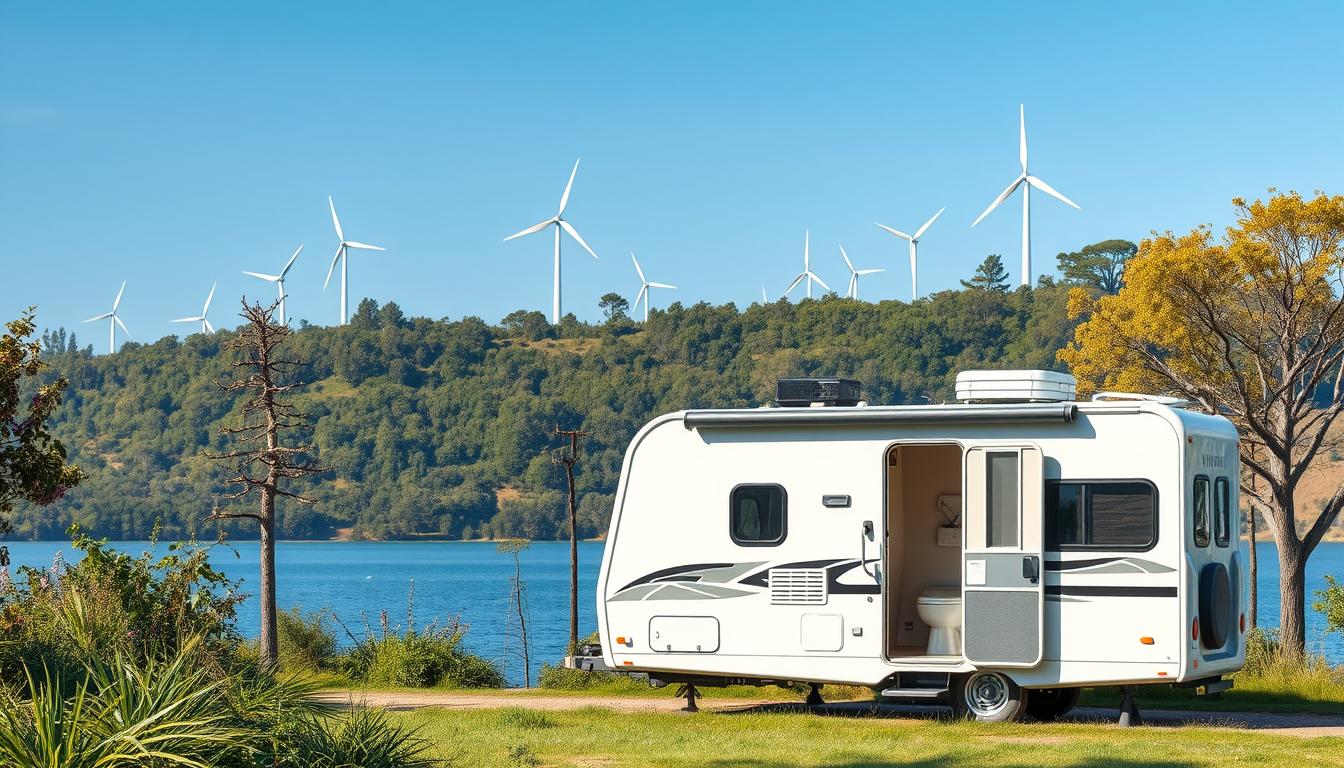Did you know RV parks can save up to 30% on electricity by using energy-efficient ways? Eco-friendly RVs are now more popular for those who love adventure and care about the planet. Looking for the right green RV means checking out important features that help reduce your carbon footprint and make your trip better.
In this journey into sustainable RVs, we’ll look at essential traits of eco-friendly motorhomes and travel trailers. From cool solar power systems to saving water, the tech in eco-friendly RVs is amazing. Let’s find out the top 10 things to look for in a green RV that makes your adventure greener and better.
Key Takeaways
- Eco-friendly RVs offer a range of sustainable features to reduce environmental impact
- Understanding the key features can help you make an informed decision when choosing a green RV
- Manufacturers like Airstream, Forest River, TAXA, and Living Vehicle offer a variety of eco-friendly models
- TRA Certification provides a green standard for evaluating the sustainability of RVs
- Integrating solar power, energy-efficient appliances, and water conservation solutions can significantly improve an RV’s eco-friendliness
Understanding the Rise of Sustainable RV Travel
The RV industry is changing to meet the need for eco-friendly travel. Old RVs used a lot of fuel and resources. But, new eco-friendly RV tech is making travel greener.
The Growing Demand for Green Recreation
Younger people want RVs that are good for the planet. Almost 90% of Gen X is ready to pay more for green products. This change is making RV makers create sustainable camping, low-emission RVs, and energy-efficient travel trailers.
Environmental Impact of Traditional RVs
Old RVs hurt the environment a lot. But, the RV world is now focusing on being green. They’re adding tech like solar panels and water savers to lessen harm.
The Evolution of Eco-Friendly RV Technology
The RV world is getting greener with new tech. Keystone RV has solar-ready models. Airstream’s E-Stream is electric and light. Winnebago’s Solis uses solar to charge appliances.
These new techs are making RV travel better for the planet. They meet the need for environmentally conscious RVing.
TRA Certification: The Green Standard for RVs
The TRA Green RV Certification is the top choice for green RVing. TRA Certification, Inc. checks RVs for energy use, water saving, air quality, and more. This makes sure eco-tourism vehicles really care about the planet and sustainable RVing.
To get the TRA Green RV Certification, RVs must pass tough tests. They need efficient systems, LED lights, and green building. They also have to keep the air inside clean and use less water. This shows they’re serious about being environmental RVs.
- Comprehensive evaluation of energy efficiency, resource conservation, indoor air quality, and water efficiency
- Certified RVs utilize efficient heating, cooling, and lighting systems, along with sustainable construction practices
- Indoor air quality is a priority, with low-emission materials and proper ventilation
- Water-efficient fixtures and instant water heaters demonstrate a commitment to conservation
The TRA Green RV Certification helps people find the greenest RVs. It’s a great way to choose eco-tourism vehicles and sustainable RVing that match your values.
Solar Power Systems and Energy Management
More people want to be kind to the planet. That’s why solar-powered RVs are getting popular. They use solar panels and smart systems to cut down on traditional power use.
Solar Panel Integration Options
RV makers now have many solar panel choices. You can get panels on the roof or portable ones. These energy-efficient motorhomes come with solar panels that look good and work well.
Some RVs, like the Coachmen Apex Ultra Lite, come with solar panels ready to go. This makes it easier to switch to off-grid RVs.
Battery Storage Solutions
Advanced battery solutions, like lithium-ion, help keep the power going. These batteries hold more energy, last longer, and charge up fast. They change how solar-powered RVs handle their power.
Energy-Efficient Appliances
RVs are getting even greener with energy-efficient appliances. Things like LED lights and smart HVAC systems use less power. This lets off-grid RVs run longer on solar power.
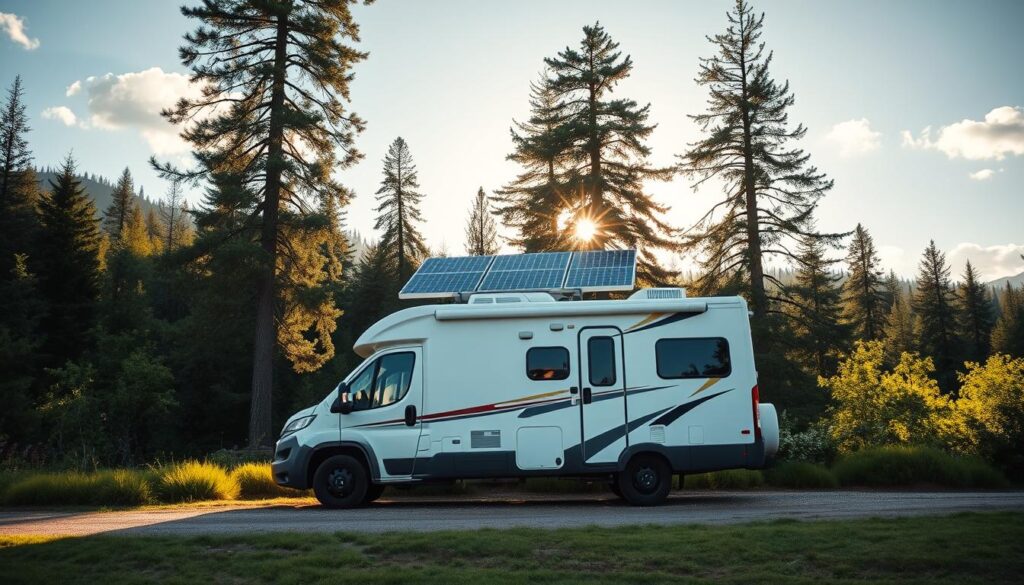
By combining solar power, smart batteries, and green appliances, renewable energy RVs are changing the RV world. They let adventurers enjoy the outdoors while being kind to the planet.
Eco-Friendly RVs: Top Manufacturers and Models
More people want to travel in a way that’s good for the planet. RV makers are listening and making green RVs. These RVs use recycled materials and solar power. They’re perfect for those who love nature and adventure.
Airstream is a leader in green RVs. Their Flying Cloud line has solar panels and saves energy. Forest River‘s Work and Play series also focuses on being green. TAXA‘s Mantis model is light and has lots of solar power.
The Jayco Jay Flight SLX 7 is affordable and green. It costs between $22,997 and $31,084. The Living Vehicle is more expensive but very luxurious. It costs between $339,995 and $509,995.
Lance makes the 850 truck camper. Coachmen has the Apex Ultra Lite. Jayco offers the Jay Flight SLX 7. These RVs fit different budgets and needs.
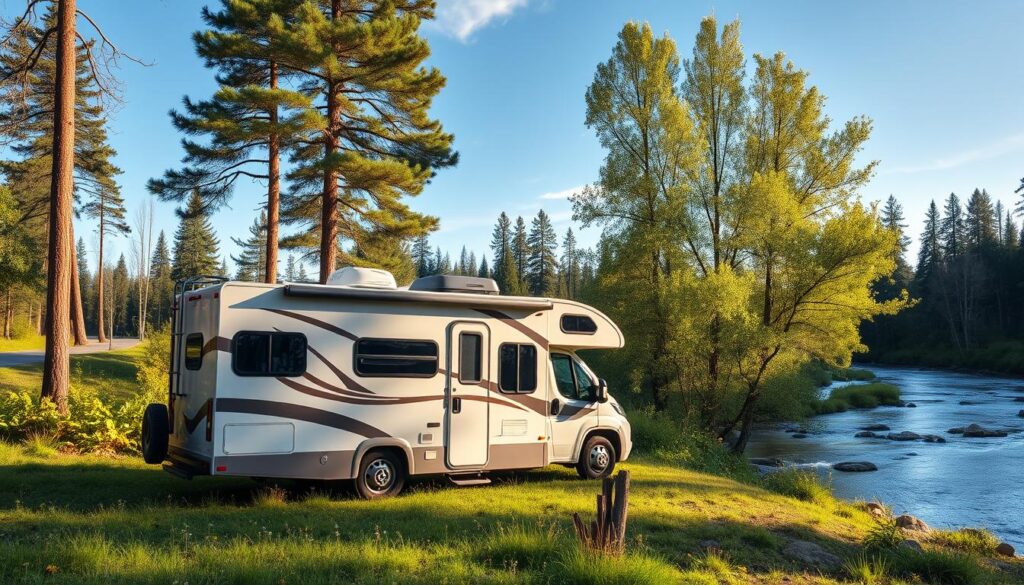
The RV world is changing fast. Brands are adding green features and high-tech stuff. This means more choices for those who want to travel green. The future of RVs looks bright and eco-friendly.
Sustainable Materials and Construction
Eco-friendly camping and sustainable motorhomes rely on the materials used. RV makers are now using recyclable materials and green processes. This helps reduce their environmental impact.
Recycled Building Components
Eco-friendly RVs use recycled parts like reclaimed wood and aluminum. They also have foam core without formaldehyde. This makes them last longer and be more durable.
Some RVs, like the TAXA Mantis, use materials that can be recycled. They also have birch wood cabinets for a greener design.
Low-Impact Manufacturing Processes
RV makers are now making their products in ways that are better for the planet. They buy parts locally to cut down on emissions. They also use shipping containers that can be reused.
The Catalina Summit Series 7 by Forest River uses aluminum and composite panels. This makes the RV better at keeping warm and moving through the air.
Durability and Longevity Considerations
Durability is key in making RVs that last. Some Airstreams from the 1930s are still traveling today. This shows how well-made RVs can last a long time.
The Puma Ultra Lite series by Forest River is light but strong. It uses aluminum and composite materials. This makes it a great choice for eco-friendly camping.
By using recyclable materials and green processes, RV makers are leading the way. They’re making RVs that are good for the planet and last a long time.
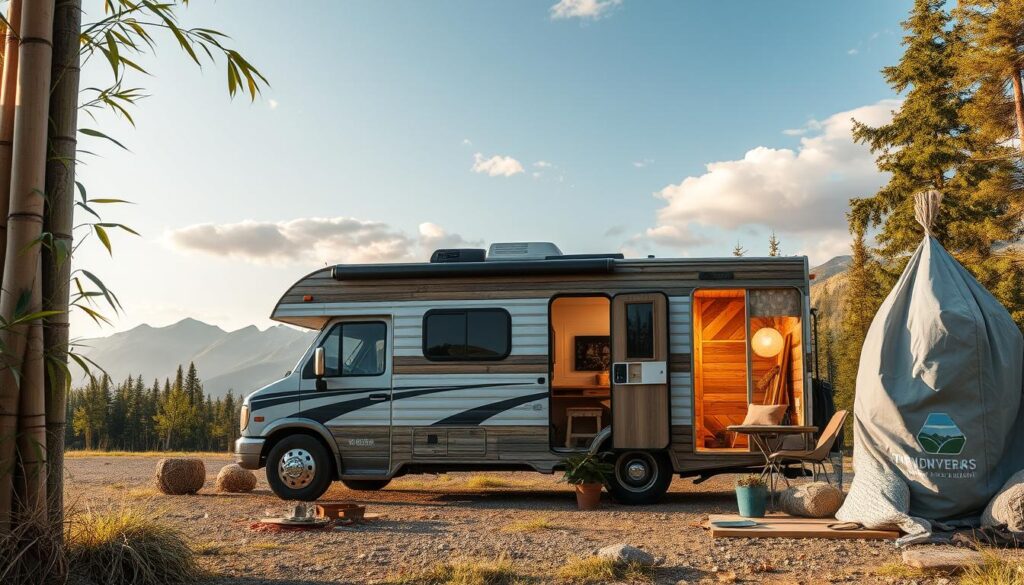
Water Conservation Features
Eco-friendly RVs focus on saving water. They have cool features to use less water and protect the environment. You’ll find low-flow faucets and rainwater catchers in the latest RVs. These help you enjoy waste-minimizing RVs, environmental-friendly motorhomes, and eco-conscious camping.
The Forest River Work and Play has a rainwater system. It collects water for the RV. The Living Vehicle goes even further with air water generators. These make drinking water from the air, perfect for adventures without water.
- Low-flow water fixtures to reduce water consumption
- Rainwater collection systems for clean water supply
- Atmospheric water generators for off-grid water production
- Efficient water heaters and dual-flush toilets for further water savings
RV makers are making big changes with water conservation features. They’re changing the game for sustainable travel trailers and environmental-friendly motorhomes. These updates make camping better and help our planet.
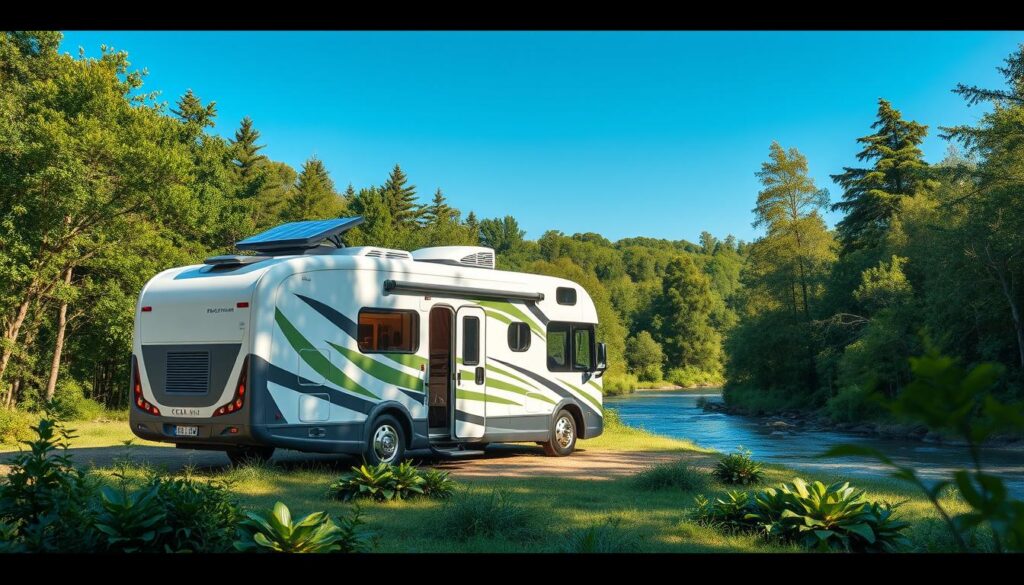
Waste Management Systems and Composting Solutions
Eco-friendly RVing means taking care of waste. No more dumping waste on the side of the road. Today, RVs use new ways to reduce harm to the environment.
Gray Water Management
Gray water systems are key in eco-friendly RVs. They use water from sinks and showers again. This water can flush toilets or water plants outside.
This cuts down on water use and waste. It helps RVers be kinder to the planet.
Sustainable Toilet Options
Composting toilets are a big deal in RVs now. They turn waste into soil. This means no need for big tanks and less water use.
These toilets are a hit with those who care about the earth. They make RVing more eco-friendly.
Modern RVs have special tanks for different waste. This makes managing waste better. It shows RVs are getting greener.
RV fans can now enjoy nature more with less harm. Thanks to new tech, RVing is greener. Gray water and composting toilets lead the way.
Aerodynamic Design and Fuel Efficiency
Eco-friendly RVs rely on aerodynamic design for better fuel use. The Airstream Flying Cloud, for example, is shaped for up to 20% better towing than boxy RVs. Using light materials and smooth shapes helps these RVs use less fuel.
Some RVs, like the Jayco Jay Flight SLX 7, focus on saving fuel while towing. Keeping tires at the right pressure boosts their fuel efficiency. As more people want low-emission campers and eco-friendly motorhomes, makers are working to make them lighter and more aerodynamic.
- The Airstream Flying Cloud’s iconic rounded shape provides 20% greater towing efficiency compared to traditional boxy designs.
- Lightweight materials and streamlined designs help reduce the overall weight of eco-friendly RVs, improving fuel efficiency.
- Models like the Jayco Jay Flight SLX 7 are engineered specifically for better fuel efficiency when towing.
- Proper maintenance, including regular tire pressure checks, can further enhance the fuel economy of eco-friendly RVs.
The RV world is changing, with a big push for aerodynamic design and fuel efficiency. This is to meet the need for eco-friendly motorhomes and low-emission campers that are both green and affordable.
Smart Technology Integration for Environmental Monitoring
Eco-conscious travelers are using smart tech in their RVs. They track energy use and battery levels. This ensures they use energy wisely. Some RVs even adjust the temperature automatically to save energy.
Environmental monitoring systems take it further. They watch water, waste, and energy use. This helps RV owners travel green. They can check and control their RV from their phones.
The future of energy-efficient campers is exciting. It comes with smart tech. This lets RV fans travel green and enjoy nature responsibly.
Smart RVs are changing the RV world. They offer better energy use and green tracking. More smart RVs mean travelers can explore freely while being kind to the planet.
Alternative Fuel Compatibility and Future Electric Options
The RV industry is changing, with more focus on eco-friendly travel. While electric RVs are rare now, new models are coming. Tesla and Ford are making electric trucks that can tow, making RV trips greener.
Hybrid and Electric Developments
The RV world is moving towards hybrids. These mix electric power with gas engines for longer trips. This lets RV fans travel green and go far.
Biodiesel Capabilities
Some RVs can run on biodiesel, a cleaner fuel than regular diesel. Biodiesel is made from plants and cuts down on emissions. This makes RV trips better for the planet.
RVs are getting greener with electric, hybrid, and biodiesel tech. Makers are working hard to make eco-friendly RVs that go far. This meets the need for green RV adventures.
Conclusion
I’m excited to start my journey in sustainable RV living. Eco-friendly travel is getting better. Now, we have green camping and RVing that’s good for the planet.
Eco-friendly RVs come with cool features. They have solar power, energy-saving appliances, and use sustainable materials. They also help save water.
The TRA Certification helps me choose the right RV. It makes sure my RV is good for the environment. I’m looking forward to electric and hybrid RVs to make my travels even greener.
Choosing an eco-friendly RV lets me enjoy nature without harming it. It helps make the future cleaner and better. Plus, it makes my trips quieter and more peaceful.
So, I’m ready for my next adventure. My eco-friendly RV will be my perfect travel buddy. We’ll explore the world together, sustainably.

